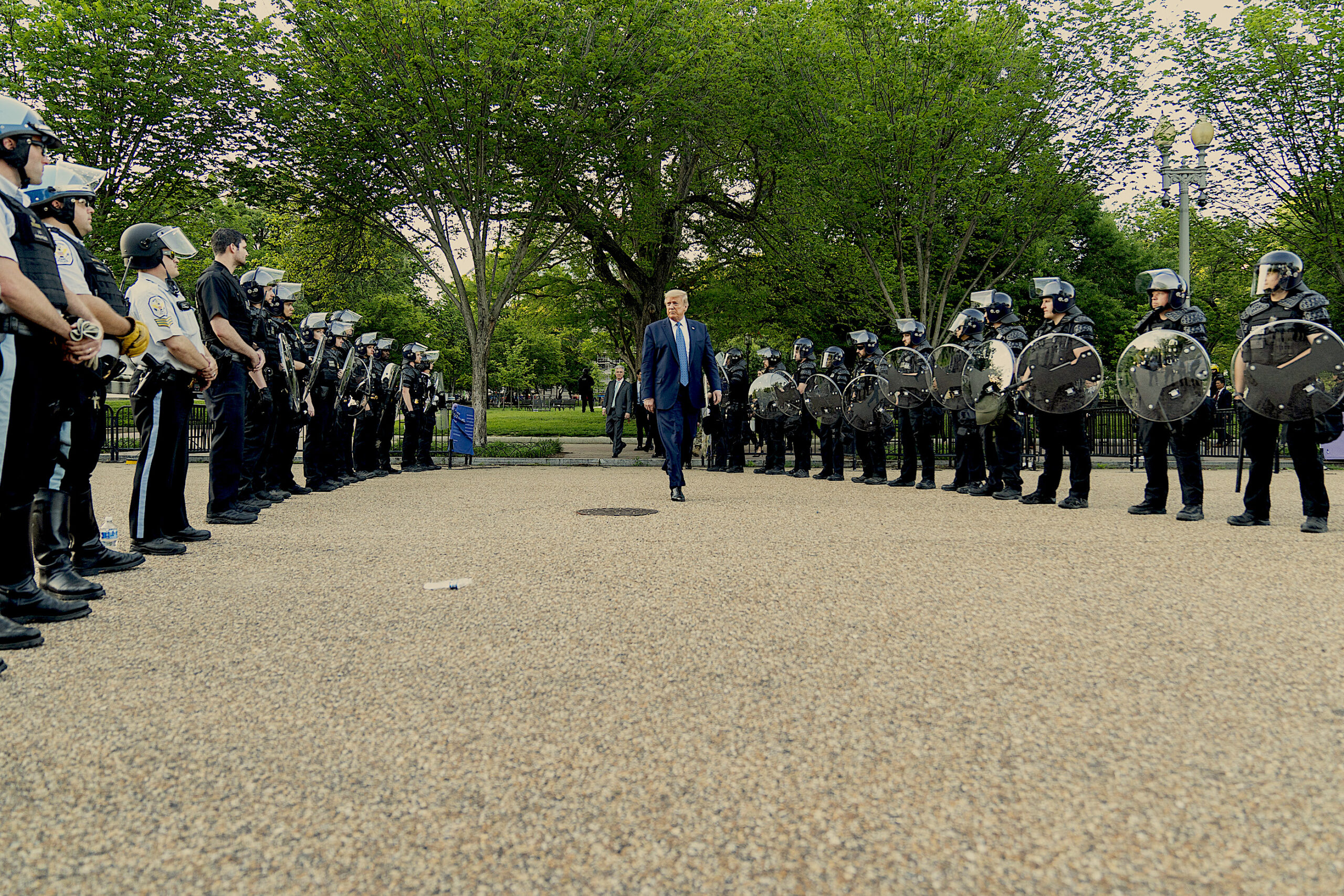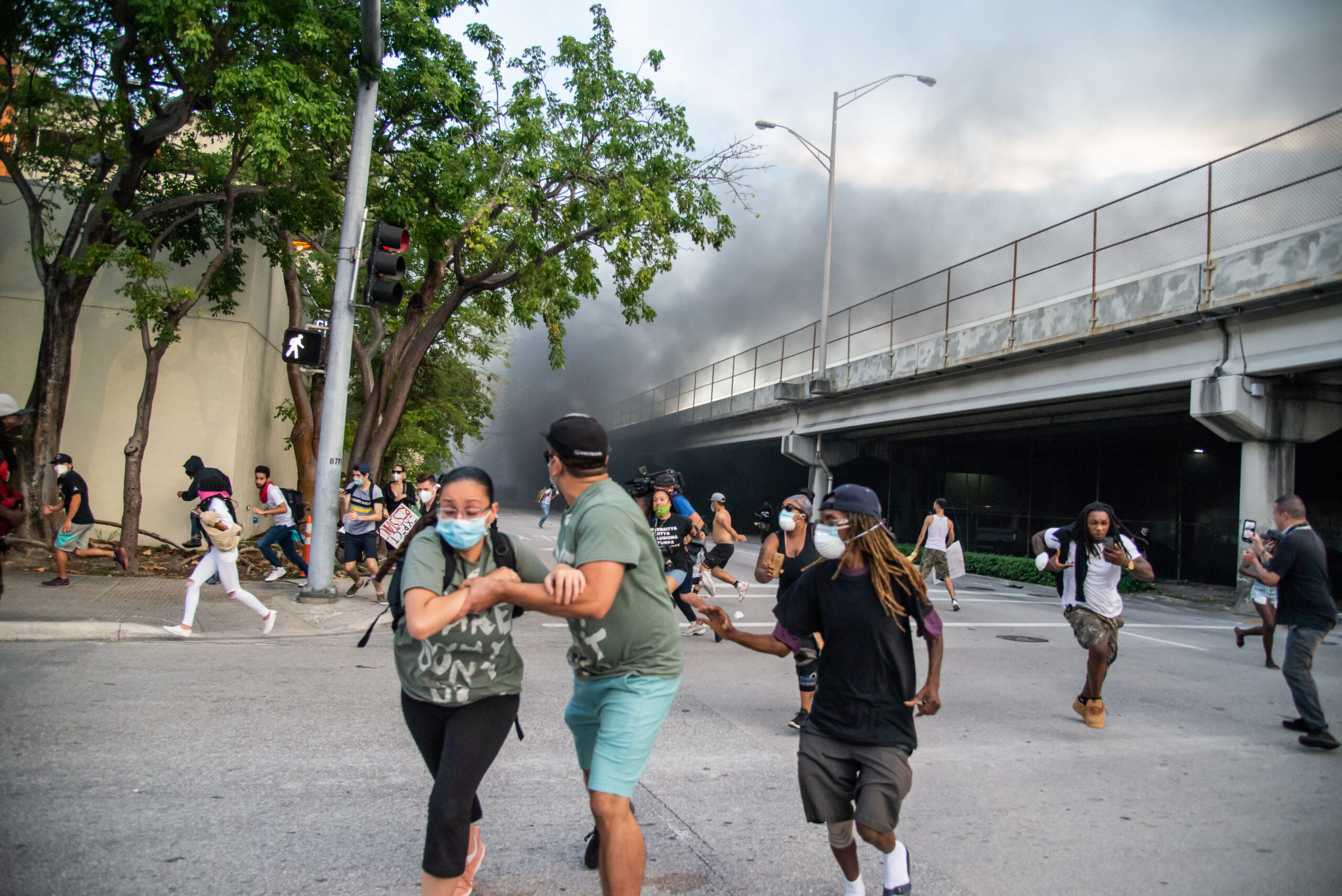A monitoring group says a disproportionate response by law enforcement goes beyond what is acceptable in policing protests, even during an emergency.

U.S. president Donald Trump walks to St. John’s Church amid protests following the police killing of George Floyd, Washington, D.C., June 1, 2020. (White House)
By Débora Leão and Suraj K. Sazawal
in São Paulo and Washington
Inter Press Service
Few images better illustrate the recent decline in civil liberties in the United States than that of peaceful protesters near the White House being violently dispersed so Donald Trump could stage a photo-op.
Moments before the president emerged from his bunker on June 1 to hold a bible outside a boarded-up church, federal officers indiscriminately fired tear gas at people who had gathered in Lafayette Park to protest about the police killing of George Floyd. This was far from an isolated incident: nationwide protests against systemic racism and police brutality have been met with widespread police violence.
Since May, the CIVICUS Monitor, an online platform that tracks fundamental freedoms across 196 countries, documented dozens of incidents where law enforcement officers, dressed in riot gear and armed with military grade-equipment, responded to Black Lives Matter protests with excessive force. These include officers driving vehicles at crowds of protesters and firing tear gas canisters and other projectiles at unarmed people, leaving at least 20 people partially blinded.
Throughout the year, journalists and health workers, clearly marked as such while covering the protests, have been harassed and assaulted. In one incident caught on live TV, a news reporter and camera operator from Louisville, Kentucky, were shot by police with pepper balls while covering protests over the police killing of Breona Taylor.
This sustained repression of protests and an increased crackdown on fundamental freedoms led to the U.S. civic space rating being downgraded from “narrowed” to “obstructed” in our new report, People Power Under Attack 2020.

George Floyd protesters in Miami react to police firing chemical irritants on May 30, 2020. (Mike Shaheen, CC BY 2.0, Wikimedia Commons)
This disproportionate response by law enforcement officers to protesters goes beyond what is acceptable practice when policing protests, even during an emergency. Under international law, people have a right to assemble freely. Any restrictions to this right must be proportionate and necessary to address an emergency or reestablish public order.
Kettling & Mass Arrests
The systematic use of excessive force and tactics such as kettling and mass arrests to enforce curfews raise troubling questions about the role of law enforcement agencies in responding to mass protests. The use of such tactics is contradictory to the alleged goal of maintaining public safety and health as they escalated tensions and prevented people from dispersing in a peaceful manner.
Even more concerning, they relocated protesters from open, outdoor spaces to police stations and other indoor facilities that often lack adequate space to allow for distancing, placing people at heightened risk for exposure to Covid-19.
While recent brutality against protests for racial justice is concerning, the decline in basic freedoms in the U.S. began before this crackdown. The repression seen in 2020 was preceded by a wave of legislation limiting people’s rights to protest.
Please Contribute to Consortium News
During its 2020 Winter Fund Drive
In recent years, several states enacted restrictive laws which, for example, criminalize protests near so-called critical infrastructure like oil pipelines, or limit demonstrations on school and university campuses. Increased penalties for trespassing and property damage are designed to intimidate and punish climate justice activists and organisations that speak out against fossil fuels.
Anti-Protest Legislation
In the wake of Black Lives Matter protests, some of the “anti-protest” bills introduced this year seem particularly cruel, for instance, by proposing to make people convicted of minor federal offences during protests ineligible for pandemic-related unemployment benefits.
Growing disregard for protest rights underscores wider intolerance for dissent. In parallel with restrictions on the freedom of peaceful assembly, the U.S. also saw an increase in attacks against the media, even before Black Lives Matter demonstrations erupted. Over the past three years, the CIVICUS Monitor has documented the frequent harassment of journalists by the authorities and civilians while covering political rallies or when conducting interviews.
LA Sheriffs surrounded a peaceful press conference by @NLG_LosAngeles this morning.
Sheriffs in riot gear pointed weapons at press and legal observers. A sheriff assaulted a lawyer.
County Supervisor @mridleythomas condemned the blatant intimidation tactics.? IG:vishal.p.singh pic.twitter.com/BKcUrDI3bW
— Chad Loder (@chadloder) September 12, 2020
Correspondents critical of the Trump administration or reporting on the humanitarian crisis in the U.S.-Mexico border region sometimes faced retaliation; documents obtained by “NBC 7 Investigates” in 2019 showed the U.S. government created a database of journalists who covered the migrant caravan and activists who were part of it, in some cases placing alerts on their passports.
In January 2020 a journalist was barred from accompanying Secretary of State Mike Pompeo in an official trip to Europe after Pompeo objected to the questions by another reporter from the same outlet.
The harsh treatment of people wanting to express themselves and the decline of civil liberties is part of a broader global decline in fundamental freedoms. Our new report shows less than four percent of the world’s population live in countries that respect the freedoms of association, peaceful assembly and expression.
Each country’s civic space is rated in one of five categories: open, narrowed, obstructed, restricted, or closed. The U.S. was one of 11 countries downgraded from its previous rating.

George Floyd protest against police violence, May 30, 2020, Lafayette Square, Washington, D.C. (Rosa Pineda, CC BY-SA 4.0, Wikimedia Commons)
In the Americas, three other countries showed significant declines: Chile and Ecuador were downgraded to “obstructed” and Costa Rica’s rating changed to “narrowed.” In the first two countries, as with the U.S., rating changes reflected unnecessary and disproportionate crackdowns on mass protest movements.
Violations of protest rights were common across the region, with detention of protesters and excessive use of force among the top five violations of civic freedoms recorded this year. In addition, the Americas continue to be a dangerous place for those who dare to stand up for fundamental rights: across the world, 60 percent of human rights defenders killed in 2020 came from this region.
Stopping the erosion of fundamental freedoms requires a robust response. Governments must take steps to repeal legislation restricting the freedoms of association, peaceful assembly and expression and make sure those who violate these freedoms are held accountable.
In the U.S. the incoming Biden administration must actively work to reverse the narrowing of civic space. To rebuild trust between people and law enforcement, for instance, the Department of Justice should investigate misconduct and discriminatory practices at local police departments.
The authorities must engage with civil society and human rights defenders to create an environment where they are able to fulfil their vital roles and hold officials accountable.
Débora Leão is a civic space researcher at CIVICUS, the global civil society alliance. She has a Master of Public Policy degree. Prior to joining CIVICUS, Débora worked on advocacy and research related to civic participation, urban development and climate justice.
Suraj K. Sazawal serves on the board to Defending Rights & Dissent and is co-author of ‘Civil Society Under Strain’, the first book to explore how the War on Terror impacted civil society and hurt humanitarian aid.
This article is from Inter Press Service.
The views expressed are solely those of the authors and may or may not reflect those of Consortium News.
Please Contribute to Consortium News During its 2020 Winter Fund Drive
Donate securely with
Click on ‘Return to PayPal’ here.
Or securely by credit card or check by clicking the red button:



Verily. The US has been the land of the free and the home of the brave largely only for those who live in the sparsely populated areas of the US. And those areas are shrinking rapidly. Sadly, there is a huge discontinuity between what the US is and what the American people think it is. The American people are in for a huge shock.
The Biden administration will do nothing to restore an open society. The Democrats are just as much imperialists and corporatists as any Republican. To believe otherwise is to be incredibly naive. As long as capitalism is still the dominant ideology, things will only get worse, not better.
…”the Americas continue to be a dangerous place for those who dare to stand up for fundamental rights: across the world, 60 percent of human rights defenders killed in 2020 came from this region.” Well yeah, guess who is is the major influence, supplier and trainer of police and military in the Americas? The country that has been called, “the great fear in Latin America.”
It seems that tactics used abroad are in increasing use here; hopefully that will moderate some with “el Duce” gone.
Shining light on systemic prejudice and injustice –
Basta!
It’s difficult to take seriously the claim that civil liberties in the USA have deteriorated recently. Perhaps if we only use the last decade, then there might be a case. But the USA’s history is one of enslavement, Jim Crow, public lynchings, sheriffs setting dogs on protestors, the shooting of students by the National Guard… and, of course, the private dictatorships known as employers. Owing to the sacrificial work of those many protestors and political workers, the USA is probably freer for more of its people than at any time since its founding.
Yep, Nailed it. Sadly I don’t see it ending soon.